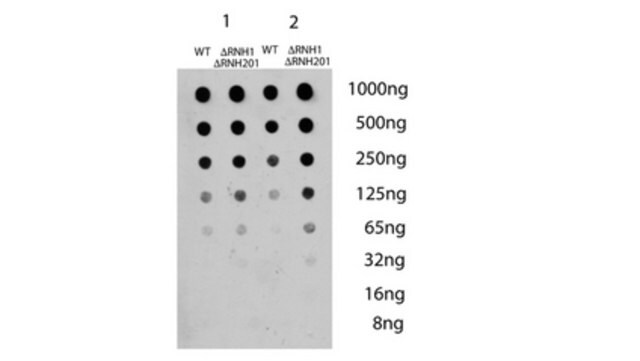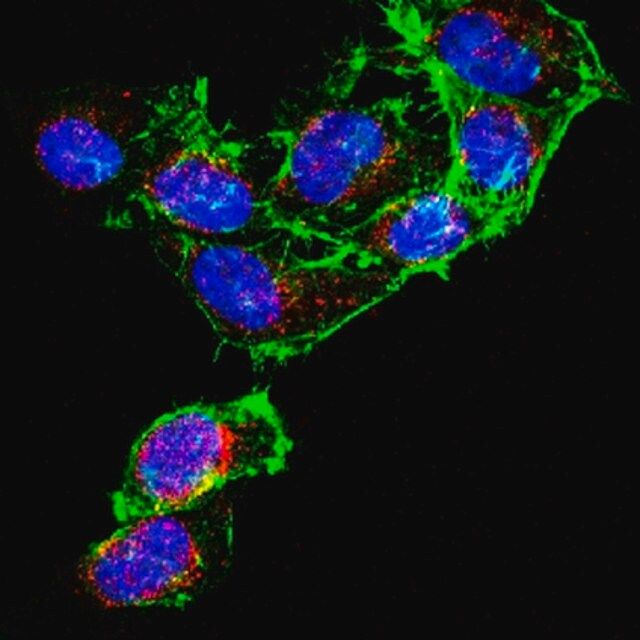您的位置:首页 > 产品中心 > Anti-DNA-RNA Hybrid Antibody, clone S9.6
Anti-DNA-RNA Hybrid Antibody, clone S9.6

产品别名
Anti-DNA-RNA Hybrid Antibody, clone S9.6
DNA-RNA Duplex, DNA/RNA Duplex, DNA:RNA Duplex, DNA-RNA Hybrid, DNA/RNA Hybrid, DNA:RNA Hybrid, RNA-DNA Duplex, RNA/DNA Duplex, RNA:DNA Duplex, RNA-DNA Hybrid, RNA/DNA Hybrid, RNA:DNA Hybrid
基本信息
| eCl@ss | 32160702 |
| NACRES | NA.41 |
| General description【一般描述】 | DNA-RNA hybrids are a natural occurrence within eukaryotic cells and their level are high at sites of high transcriptional activity. They are non-canonical nucleic acid structures with transcriptional regulatory functions. Their presence is reported to predispose a locus to chromosomal breakage. A locus forming an DNA:RNA creates a double-stranded A/B intermediate conformation, with a second target for single-stranded nucleic acid binding proteins on the complementary, displaced DNA strand. They are shown to be resistant to the activity of DNA methyltransferases. The formation of DNA:RNA hybrids has been associated with a number of neurological diseases. Mutations in the DNA:RNA helicase senataxin (SETX) are implicated in the dominant juvenile form of amyotrophic lateral sclerosis type 4 and a recessive form of ataxia oculomotor apraxia type 2. |
| Specificity【特异性】 | Clone S9.6 bound the DNA-RNA heteropolymer and poly(I)-poly(dC) equally, but 100-fold higher levels of poly(A)-poly(dT) were required to achieve a similar degree of binding. Single-stranded DNA, double-stranded DNA and RNA, and ribosomal RNA were not bound by clone S9.6 (Boguslawski, S.J., et al. (1986). J. Immunol Methods. 89(1):123-130). Target DNA-RNA heteroduplex (R loop) structure is not sequence- or species-specific. |
| Immunogen【免疫原】 | DNA-RNA heteropolymer duplex prepared by transcription of phi X174 single-stranded DNA with DNA-dependent RNA polymerase (Boguslawski, S.J., et al. (1986). J. Immunol Methods. 89(1):123-130). |
| Application【应用】 | Anti-DNA-RNA Hybrid, clone S9.6, Cat. No. MABE1095, is a highly specific mouse monoclonal antibody, that targets DNA-RNA hybrid and has been tested in Affinity Binding Assay, Chromatin Immunoprecipitation (ChIP), ChIP-seq, Dot Blot, Immunocytochemistry, and Immunoprecipitation. Research Category Epigenetics & Nuclear Function Dot Blot Analysis: 0.2 µg/mL from a representative lot detected an enhanced level of DNA-RNA hybrids in genomic extracts from RNase H-deficient yeast strain than extracts from wild-type strain (Courtesy of Lorenzo Costantino, Ph.D., Koshland Lab, University of California at Berkley, U.S.A.). Affinity Binding Assay: Clone S9.6 bound the DNA-RNA heteropolymer and poly(I)-poly(dC) equally, but 100-fold higher levels of poly(A)-poly(dT) were required to achieve a similar degree of binding. Single-stranded DNA, double-stranded DNA and RNA, and ribosomal RNA were not bound by clone S9.6 (Boguslawski, S.J., et al. (1986). J. Immunol Methods. 89(1):123-130). Chromatin Immunoprecipitation (ChIP) Analysis: A representative lot detected increased DNA RNA hybrids at four actively transcribed genes upon shRNA-mediated knockdown of BRCA1 or BRCA2, but not PCID2 or RAD51 in HeLa cells (Bhatia, V., et al. (2014). Nature. 511(7509):362-365). Chromatin Immunoprecipitation (ChIP) Analysis: A representative lot detected R-loops formed over beta-actin gene using HeLa chromatin preparation. RNase H treatment of the chromatin preparation prevented clone S9.6 from immunoprecipitating target chromatin fragments (Skourti-Stathaki, K., et al. (2011). Mol. Cell. 42(6):794-805). Chromatin Immunoprecipitation-sequencing (ChIP-seq) Analysis: A representative lot detected genome-wide distribution of DNA-RNA hybrids in budding yeast by ChIP-seq analysis (El Hage, A., et al. (2014). PLoS Genet. 10(10):e1004716). Immunocytochemistry Analysis: Representative lots immunolocalized nuclear R loops by fluorescent immunocytochemistry staining of methanol-fixed H1 human embryonic stem cells (hESCs) and formaldehyde-fixed HeLa cells (Bhatia, V., et al. (2014). Nature. 511(7509):362-365; Ginno, P.A., et al. (2012). Mol. Cell. 45(6):814-825). Immunoprecipitation Analysis: A representative lot immunoprecipitated in vitro transcribed R-loop substrate (DNA-RNA hybrid), but not doouble-stranded DNA (dsDNA) (Ginno, P.A., et al. (2012). Mol. Cell. 45(6):814-825). |
| Quality【质量】 | Evaluated by Immunocytochemistry in HeLa cells. Immunocytochemistry Analysis: A 1:50 dilution of this antibody immunolocalized nuclear and mitochondrial DNA-RNA hybrids in 4% paraformaldehyde-fixed, 0.3% Triton X-100-permeabilized HeLa cells. |
| Physical form【外形】 | Protein G purified. Purified mouse IgG2aκ in buffer containing 0.1 M Tris-Glycine (pH 7.4), 150 mM NaCl with 0.05% sodium azide. Format: Purified |
| Other Notes【其他说明】 | Concentration: Please refer to lot specific datasheet. |
产品性质
| Quality Level【质量水平】 | 100 |
| biological source【生物来源】 | mouse |
| antibody form【抗体形式】 | purified immunoglobulin |
| antibody product type | primary antibodies |
| clone【克隆】 | S9.6, monoclonal |
| species reactivity (predicted by homology) | all |
| technique(s) | ChIP: suitable affinity binding assay: suitable dot blot: suitable immunocytochemistry: suitable immunoprecipitation (IP): suitable |
| isotype【同位素/亚型】 | IgG2aκ |
| shipped in【运输】 | ambient |
产品说明
| Storage and Stability【储存及稳定性】 | Stable for 1 year at 2-8°C from date of receipt. |
| Disclaimer【免责声明】 | Unless otherwise stated in our catalog or other company documentation accompanying the product(s), our products are intended for research use only and are not to be used for any other purpose, which includes but is not limited to, unauthorized commercial uses, in vitro diagnostic uses, ex vivo or in vivo therapeutic uses or any type of consumption or application to humans or animals. |
安全信息
| Storage Class Code【储存分类代码】 | 12 - Non Combustible Liquids |
| WGK | WGK 1 |





